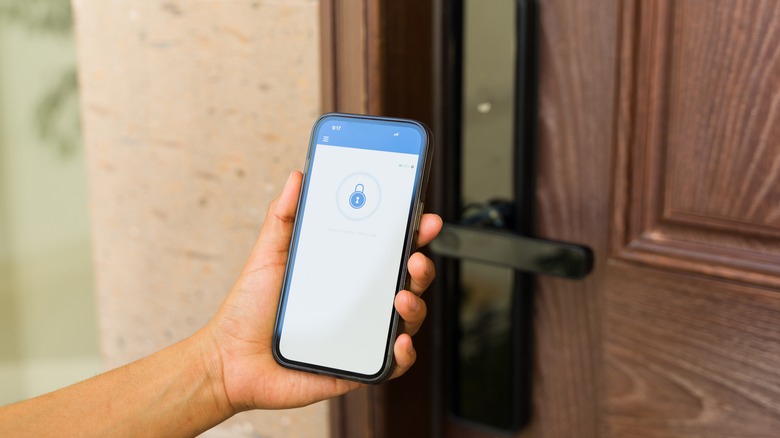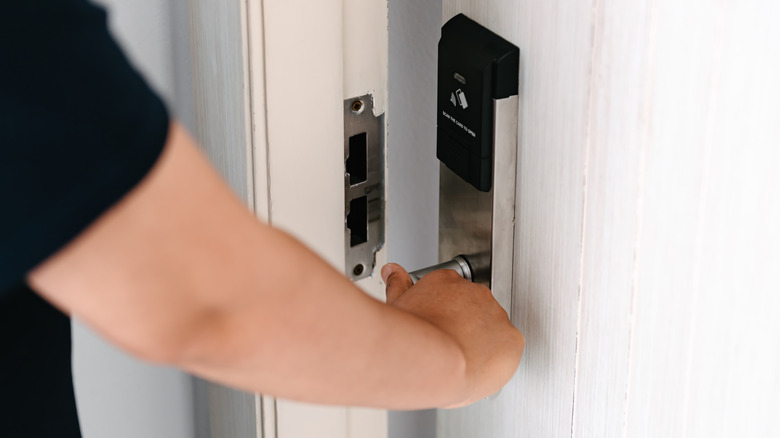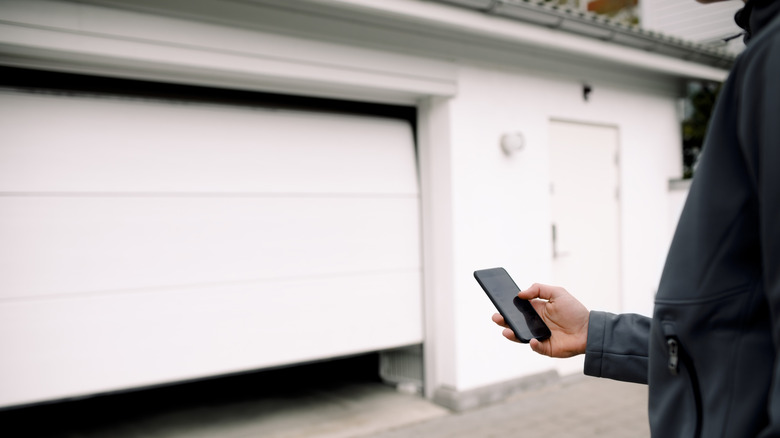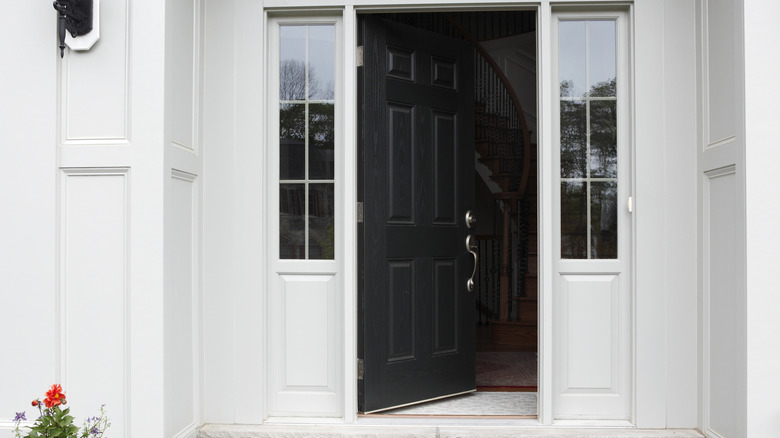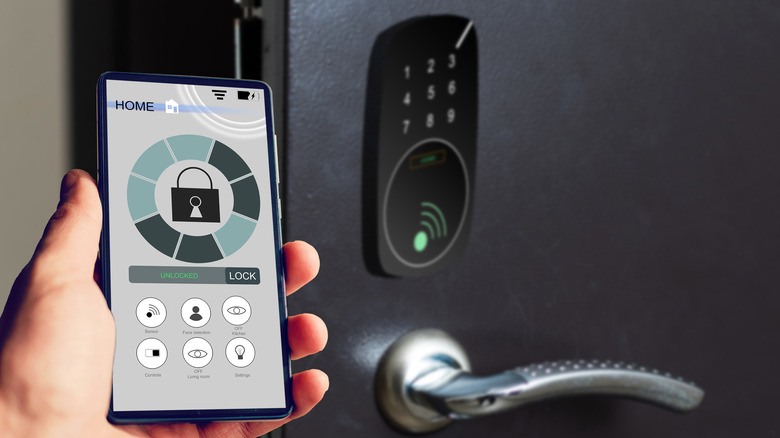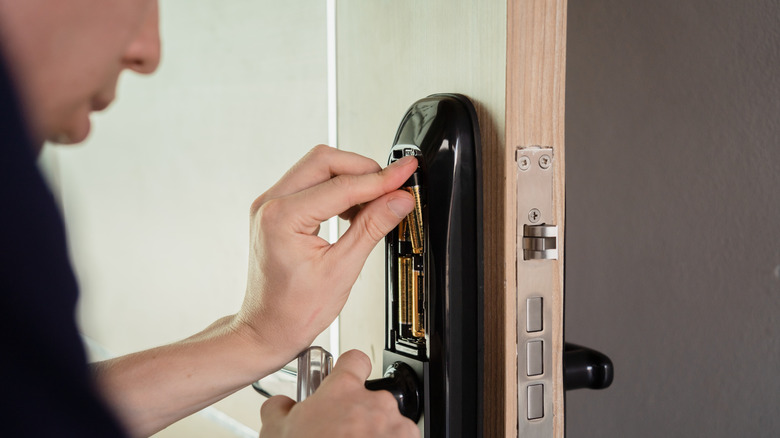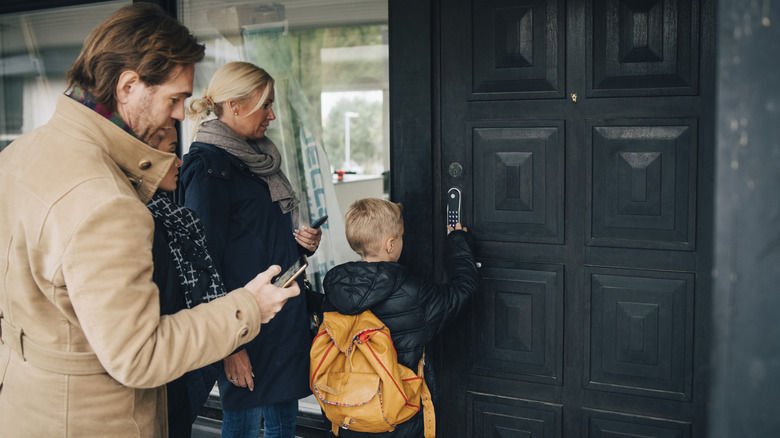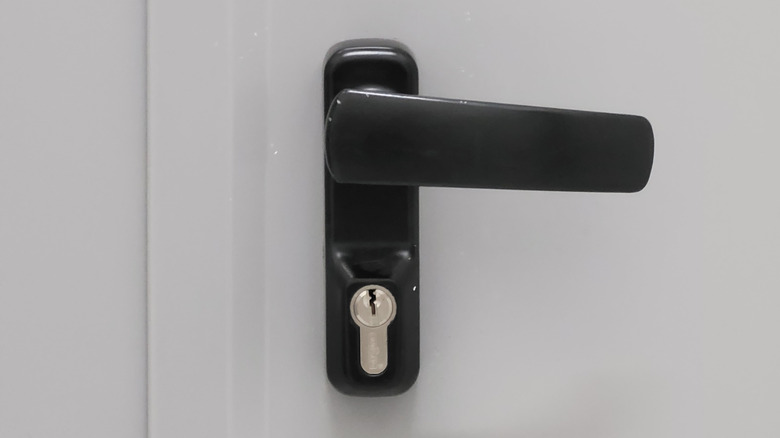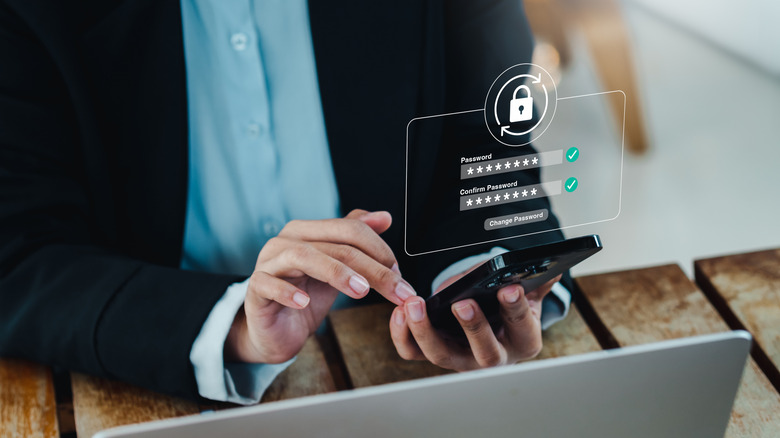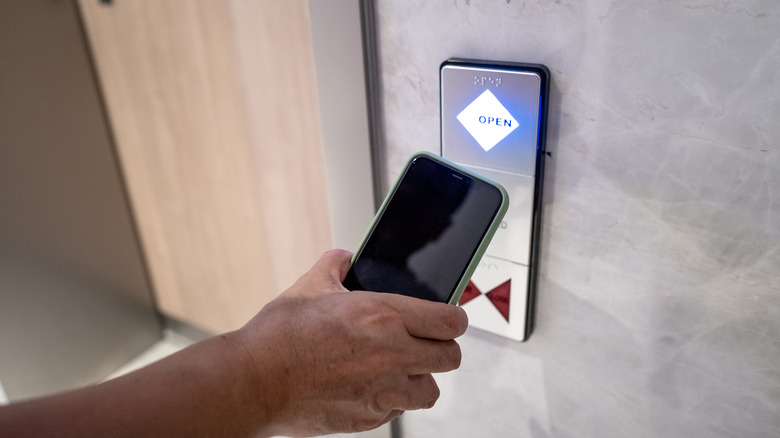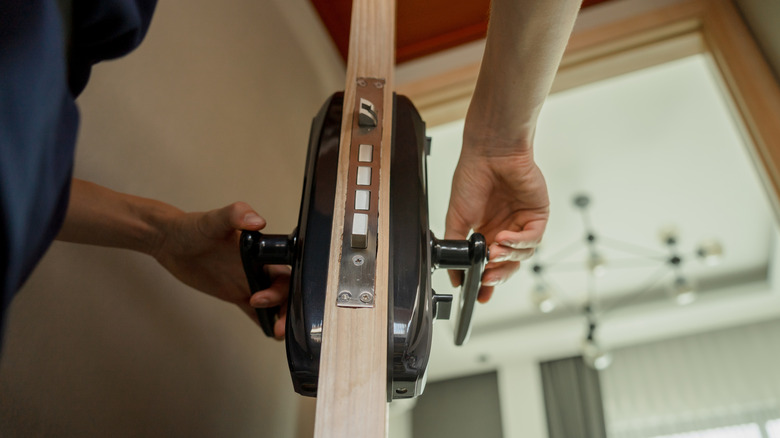10 Things You Need To Know Before Adding A Smart Lock To Your Home
It used to be that to get into your home, you needed a key. If you lost that key, you either had to call a locksmith (or maybe your landlord) or break into your own home. If you happened to be 10-year-old me, you also had to carry said key on a 12-inch wood-post "keychain" so you wouldn't forget it a second or third time. Thankfully, there is a modern solution to the age-old problem of misplacing your house key: an electronic smart lock.
A smart lock eliminates the need for a physical key and offers multiple ways to lock and unlock your door. Most smart locks have an app function, a fingerprint scanner, and the option to set a code for each member of the family (or your neighbor) for easy access.
From Alexa-compatible smart locks that secure your door with a command to home automation systems that mean you don't have to lift a finger to ensure your home is secure at night, there's a smart lock solution for just about every scenario. Some smart locks have even gone viral on social media for their ease of use and security features. That said, there are some things to know before you add a smart lock system to your shopping cart.
Most security concerns are myths
When you start considering whether to buy a smart lock, your first instinct might be to search up whether a smart lock is safe. After all, swapping out ol' reliable — a deadbolt — can be a bit nerve-wracking. Technology isn't always reliable, even if it has come a long way. In most cases, though, security concerns are largely unfounded.
Home security company ADT says smart locks are safe, especially if they're of the deadbolt variety, because deadbolts can't be picked like a pin and tumbler lock can. The average doorknob can, in theory, be easily picked by a thief who knows what they're doing. To "pick" a smart lock, would-be criminals either need to be super-smart and guess your passcode or know how to bypass complicated security protocols.
The fact that smart locks are hard to hack should give homeowners peace of mind. Smart locks for renters can also ease concerns about unauthorized access without creating problems with getting your security deposit back.
ADT says most smart locks — at least those that come from reputable companies — are sturdy and resistant to being hacked or picked. There's also the benefit that a smart lock system is safer than a traditional lock After all, a physical key can be stolen or lost — a passcode or fingerprint is much harder to swipe.
Hacking is a real possibility
Although hacking is not as big an issue as the many myths about smart locks suggest, it's still a possibility. There isn't a ton of information available about how hackers might infiltrate a smart lock system, but depending on how your lock is built, it might be susceptible to brute force, if nothing else.
Features like audio and video might also make your smart lock less secure. Someone could, in theory, hack into your Wi-Fi and sift through your footage or spy on you or your visitors. Still, many hacking strategies would involve bypassing not only the security features on your home Wi-Fi system, but also your smartphone's security functions. With most iPhone-compatible smart locks, security isn't going to be a problem, since Apple takes it so seriously.
On the same note, most reputable smart lock brands use multiple security features to protect your home and your data. Encryption, the same kind credit cards have, is one way smart lock companies defend your data. Dual-factor authentication and improved wireless technology (think Bluetooth, but upgraded) are an additional defense. Of course, a criminal intent on entering your home will probably break a window before they'll try to pick a lock, and that's true no matter what kind of lock you have.
Your biggest problem might be your house
Smart locks can be convenient and safe as part of a smart home, but what if your house isn't that smart? In some cases, the home itself might cause problems that make your smart lock frustrating, inefficient, and possibly even unusable. While installing the smart lock properly is the first step, sometimes you can't avoid structural problems.
We installed a smart lock — the same brand as both my dad and sister use at their houses — after seeing how convenient they were day to day. It didn't take my husband long to install the lock (we got the ULTRALOQ U-Bolt Pro Smart Lock), and while he made the finishing touches, I downloaded the app, plugged in the Wi-Fi bridge adapter, and started setting codes for our whole family. The adults also got a fingerprint scan for convenience.
Everything went well for a few weeks, and I loved not having to worry about grabbing a house key (we have many access doors) before leaving. But as the seasons changed, our 1980s house apparently settled, and suddenly the lock wouldn't work anymore because the deadbolt couldn't slide into place properly.
If your house is like mine and seems to expand and shrink ever so slightly in different seasons, a smart lock might not be the solution you're hoping for. The door itself, or the frame, could also expand after exposure to moisture, wreaking more havoc. The worst part is there's no way to know beforehand exactly what might go wrong structurally.
Not all locks work with all doors
Some smart locks are super convenient and work with nearly any door. For example, the SwitchBot Lock Pro we reviewed was especially renter-friendly with a retrofit design — but not all are as easy to install. Installation might also be difficult if you have older doors or a home with an offbeat design.
One type of door that apparently doesn't work well with smart locks is a mortise cut door. Mortise cut doors have a unique hollow cutout for the lock mechanism, so you can't swap locks easily. Some locksmiths in online forums suggest that it's expensive to retrofit this type of door with a smart lock, noting that $1,200 or more is a reasonable budget for the fix.
For renters or condo owners with a Homeowners Association, changing a mortise lock is not only expensive, it can also be out of the question due to landlord or HOA rules. There are also fire codes to consider, and retrofitting may not meet fire or general contractor standards.
Plus, there's also the chance that you'll order a smart lock that isn't compatible with your door. For the best odds at success, check out your door's lock configuration, measure the size of the door (including its thickness), and make sure there's nothing oddball about the setup before ordering or trying to install a smart lock.
Smart locks sometimes fail
There is a laundry list of things that can go wrong with a smart lock. Let's start with simple mechanical failure, like I've experienced.
Once our house settled, the lock couldn't slide into its fitting to actually lock the door. To even close it, I had to push or pull (depending on whether I was outside or inside, respectively) the door with a lot of force to align the lock in its slot. Then I had to somehow use one hand to push the lock button while hanging onto (or off of) the doorknob.
Other potential failures include Wi-Fi outages that make locking or unlocking the door impossible via app or simple power failure, whether your lock is battery powered or wired in. Sometimes, smart locks throw error codes and won't lock for whatever reason. Not only that, but if you type your code wrong — or the lock doesn't read your fingerprint after too many attempts — the security features could lock you out.
While you can't predict every type of smart lock failure, it helps to read your user's manual thoroughly and change any applicable app settings (lockout timer, for example) to help protect against access issues. Although it does defeat the purpose of a smart lock somewhat, consider keeping the secret key (my lock has one) hidden or in your car in case you ever need it.
You should set up multiple entry methods
Most smart locks are, in fact, smart, offering multiple entry methods. My lock allows passcodes for multiple people, plus each person can set their fingerprint access, too. Then there's the app, which lets me lock and unlock the door, even when I'm away from home, as a failsafe of sorts if someone gets locked out. I recommend that every smart lock user sets multiple access methods for each family member, just in case.
You never know when some kind of failure might happen. For example, a face unlock smart lock like the Lockly Visage sounds super convenient, but what if it's dark and raining when you get home, and the smart lock can't get a good look at you? In theory, a palm-reading smart lock similarly seems great, but if you've got groceries in both hands, a single finger scan might be easier to manage.
If you're really going for maximum security over convenience, it also makes sense to change your pass codes regularly, too. At the very least, aim for a code that's hard to guess. Using your family members' birthdays might make it easy for them to remember their lock code. However, it could also be a security risk if someone you know wants to get into your house when you would rather they stayed out.
You'll need a special smart lock for fire doors
Examining your door might sound silly before buying a smart lock because all locks are the same, right? But as mortise cut doors prove, weird things can happen in construction, whether you have an old home or a new build. Thus, it's important to check out your doors and determine whether there's anything that makes a smart lock hard to use or even dangerous.
For example, industry experts suggest you'll need a specially-rated smart lock for a fire door. Fire doors are designed to protect your home should a fire start in certain spaces. Usually, a fire door is placed between the garage and the rest of your house.
Fire doors have to follow specific building codes; the National Fire Protection Association has entire manuals on the subject. Fire doors must have specific fire door hardware, according to the NFPA: Section 4.6.4.3 specifically states that "fire door hardware shall be shipped from the factory with the fire door."
This seems to suggest that aftermarket hardware doesn't meet fire standards, which might give homeowners pause when replacing locks on those doors. When in doubt, it might be best to reach out to your local building authority or a contractor to see what hardware options — or smart locks — are safe to use for your home's doors.
Smart locks are not set-it-and-forget it
While smart locks are convenient and mostly easy to use, they aren't always. For one thing, if your smart lock has an affiliated app you actually want to use, you'll need to regularly login and update it. On the same note, if your app uses a password (which it should), logging in regularly ensures that you won't lose access ... or forget your password.
In addition to updating the smart lock app, you'll also want to consider what kind of power supply your lock uses. While most locks probably have, at the very least, an app alert when the device battery gets low, you may want to stock up on batteries in advance. Wiring the lock to your home's electricity is one way to avoid battery problems, but then you run into the issue of power outages in the neighborhood.
Power outages can also knock out your receiver. My lock's Wi-Fi bridge adapter plugs into the wall and needs power so that the lock stays connected to my home network and the app. My advice? Read your user manual to find out how it all works, and set up failsafes if possible. That might mean carrying that pesky backup key, or choosing a lock that doesn't use a Wi-Fi bridge at all. Some don't, but Bluetooth connections have their own logistical limitations because of signal ranges.
You won't always get a perfect fit
Despite what smart lock manufacturers (or your significant other) have to say, installation isn't always easy. You might be in for a few hours or more of DIY, depending on what equipment you're installing, what kind of door you have, and how comfortable you are with drilling holes or shaving bits off your door or door frame (or both).
My husband has installed two ULTRALOQ U-Bolt Pro Smart Locks to date, and in both cases, he had to slightly modify the doorframe to get them to work. I can only assume this is common with many types of smart locks where the manufacturer provides a strike plate to go with the lock. With the ULTRALOQ, the strike plate isn't only a plate. Rather, it's like a housing that the lock fits into. That meant my husband had to carve a hole into the door frame so that the deadbolt could extend into that spot inside the strike plate.
In my experience, the installation was a bit nerve-wracking. If you drill in the wrong place when attaching the hardware, you might have a massive hole in your door where you don't need one. Or, the door might not close at all. It's also a weird feeling when you realize that while a smart lock (or any lock) keeps the door closed rather securely, the door itself might not be so secure.
In most cases, a smart lock is worth it
Although there's a lot to consider before you install a smart lock, in most cases the hassle is worth it. As a reformed key user who was once an absentminded latchkey kid, I can understand how fingerprint scanning and keycodes help kids get in and out of the house, at least. However, alerts for parents are also a perk, and the ability to remotely lock the door behind your child (or forgetful spouse) is also priceless.
Not to mention, you can also give a code to your favorite delivery driver so you never miss a package, or set up a temporary code for the pet sitter you're not sure you want to rehire. Security camera-enabled smart locks are also a means of achieving peace of mind no matter how safe your neighborhood feels.
Security cameras are a modern must-have, so having that feature built-in makes your smart lock do extra duty. Recently, my sister-in-law was able to capture smart lock security camera footage of an escaped carjacker in her neighborhood, which helped pinpoint where he was as police closed in. A smart lock is even smarter with a camera, after all.
To be fair, your head might be spinning after considering all the pros and cons to swapping your old-fashioned door knob for a smarter system. Hopefully, our smart lock buyers' guide can help you figure out what the best option is for your home (and your stress levels).
